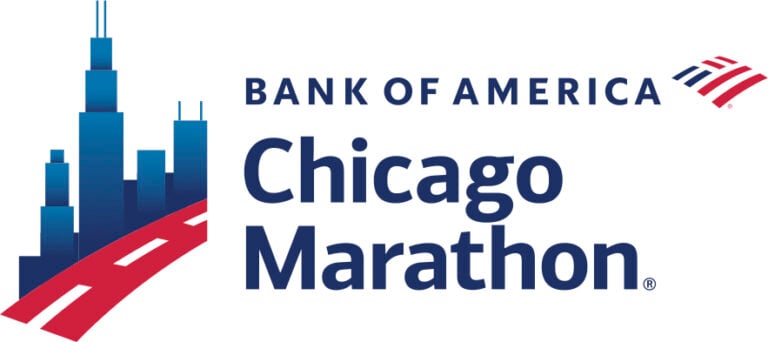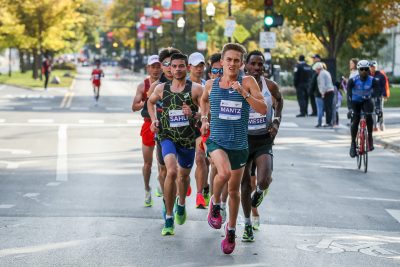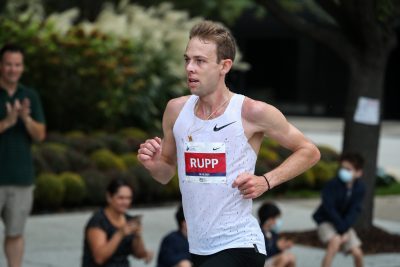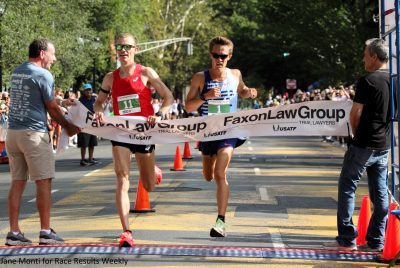2023 Chicago Marathon Men’s Preview: Mantz v Rupp and How Fast Does Kelvin Kiptum Run?
Kiptum has run 2:01 in both of his marathons so far; 37-year-old Rupp has finished only one pro race since July 2022
By Jonathan GaultThe Bank of America Chicago Marathon is always one of the highlights of the American running calendar, but it takes on a special significance in pre-Olympic years. Because of the timing, it’s a popular destination for American Olympic hopefuls: Tuesday marked exactly four months until the US Olympic Trials in Orlando, which is just enough time to run Chicago, take a week or two off, and launch a full buildup for the Trials.
It’s also an opportunity to send a message. When Jake Riley rolled up to the 2019 Chicago Marathon, no one gave him much thought: he owned a personal best of just 2:13:16 and had not run a marathon for more than three years. Then he ran 2:10:36 to finish as top American in 9th, and suddenly he was a contender. Four months later, he made the Olympic team.
As if that was not enough, Chicago represents one of the last chances for an American man to hit the Olympic standard of 2:08:10 — something no American has done yet during this cycle. If we had to bet, the US will probably get three men to Paris based on world rankings, but if the likes of Galen Rupp and Leonard Korir could hit the standard in Chicago, every American marathoner will sleep much more soundly. Conner Mantz is running Chicago, too, but his world ranking is high enough that the US is in line for one Olympic spot no matter how he runs this weekend.
That’s why Chicago will be fascinating from a US perspective, but we may have buried the lede: Kelvin Kiptum is running his first US marathon. No one has started a marathon career like the 23-year-old Kenyan. Last year in Valencia, Kiptum ran the fastest debut marathon ever, 2:01:53. In marathon #2 in London in April, Kiptum ran even faster: 2:01:25, the #2 time in history. Now he tackles Chicago, a course that hosted men’s world records in 1984 and 1999. What can he do for an encore?
Here’s what to watch for in an intriguing men’s race in Chicago.
What: 2023 Bank of America Chicago Marathon
When: Sunday, October 8. Elite race starts at 8:30 a.m. ET.
Where: Chicago, Illinois (course map)
*TV/streaming information *Full elite fields
What can Kelvin Kiptum do in marathon #3?
Through two marathons, it is not insane to argue that Kelvin Kiptum is a better marathon prospect than Eliud Kipchoge. We do not make that comparison lightly. Kipchoge is so far ahead of everyone else that you could divide his career in two and each half-Kipchoge would have a compelling claim as the GOAT. But Kipchoge has never done what Kiptum did over the second halves in Valencia and London.
Before Kiptum arrived on the scene, the fastest second half ever run in a marathon was Kipchoge’s 60:33 during his 2:01:09 world record at 2022 Berlin. In Kiptum’s debut in Valencia, he closed in 60:15. In London, he closed even faster: 59:45. That included a 27:50 split from 30-40k. And it came on a wet day in London when everyone else in the men’s and women’s elite fields were slowing down over the second half. No one in history has been able to close this hard, not even Kipchoge.
Kipchoge is still the world record holder, and the odds are still against Kiptum supplanting him as the greatest of all time — Kipchoge’s longevity is almost as impressive as his immense skill. But Kiptum may already be the best marathoner in the world right now, and his splits in Valencia (61:38/60:15) and London (61:40/59:45) show that he is capable of running significantly faster than his 2:01:25 pb.
Kiptum knows this as well, but those expecting him to challenge Kipchoge’s 2:01:09 on Sunday may have to wait.
“I will break the marathon world record, but that may not happen during the Chicago race, because I started late training and my body is not yet at its best form,” he told People Daily in September.
Another article in The Nation on Wednesday said Kiptum will be going for Dennis Kimetto‘s course record in Chicago (2:03:45), not the world record.
“I prepared well for the London Marathon in April because there was less rain compared to now. I have been battling the weather in training but I am determined to complete the program,” Kiptum said.
That said, it’s possible Kiptum goes out faster than in either of his previous marathons — we’ve heard the top group is targeting 61:00 — and conditions should be excellent for running on Sunday (high 40s/low 50s and overcast during the race; wind between 3-9 mph). Even a less-than-100% Kiptum is still capable of running very, very fast.
(Editor’s note: We will talk to Kiptum on Friday the pre-race press conference so be sure to come back and the get the scoop on what he says his fitness is and what his actual goals are).
The Challengers
No one in the field has a personal best within two minutes of Kiptum’s 2:01:25. Defending champion Benson Kipruto is the best bet to challenge him. While Kipruto is a tier below Kiptum, Kipchoge, and training partner Evans Chebet, he’s still been one of the best marathoners in the world over the last three years. Check out his results:
2021 Prague: 1st, 2:10:16
2021 Boston: 1st, 2:09:51
2022 Boston: 3rd, 2:07:27
2022 Chicago: 1st, 2:04:24
2023 Boston: 3rd, 2:06:06
In both of his major victories, Kipruto made a hard late-race move to separate from the pack. At 2021 Boston, he split 14:06 from 35k to 40k to win by 46 seconds; the next year in Chicago, he covered the same segment in 14:43 to win by 25 seconds. Against a full-strength Kiptum, that sort of move will not be enough to win — Kiptum averaged 14:09 per 5k for his second half in London. But against a Kiptum who got a late start on his training, Kipruto could be dangerous.
Belgium’s Bashir Abdi should also be in the mix. The 34-year-old Abdi has done everything in his career except win a major. He’s run very fast to win Rotterdam twice (2:03:36 in 2021, 2:03:47 this year), has bronze medals from the 2021 Olympics and 2022 Worlds, and has World Marathon Major podium finishes at Tokyo (2nd in 2020) and London (3rd in 2022).
Those are your three most likely podium finishers. Here are the other guys to keep an eye on:
- Daniel Mateiko, Kenya (debut): Mateiko has almost everything you’d want to see from a top marathon prospect. He’s run 27:03 for 10,000 on the track (finished 8th at Worlds in 2022) and has broken 59:00 in the marathon five times — most recently a 58:36 victory at the Antrim Coast Half Marathon on August 27, the fastest time in the world in 2023. We just saw two debutants run 2:03 in Berlin two weeks ago and it would not be a surprise to see Mateiko do the same in Chicago. (h/t to reader Noah; initially we missed Mateiko’s name in the list of entrants)
- Seifu Tura, Ethiopia (2:04:29 pb): Tura has finished 1st and 2nd in the last two Chicago Marathons, but the 2023 edition features much better competition than either of those races. Most recently, he was 5th in London in 2:06:38.
- Kinde Atanaw, Ethiopia (2:03:51 pb): Atanaw, who ran 2:03:51 in his debut to win Valencia in 2019 but has never run faster, has the #2 pb in the field. He was 4th at 2022 London in 2:05:27 but DNF’d 2023 London in April.
- Huseydin Mohamed, Ethiopia (2:05:05 pb): Also known as Mohamed Esa, he came less than a second from winning Tokyo in March.
- John Korir, Kenya (2:05:01): He was 3rd last year but this year’s race is much stronger.
- Wesley Kiptoo Kenya (debut): An NCAA star at Iowa State, Kiptoo, now with HOKA NAZ Elite, was 2nd in the Houston Half in January in a pb of 60:35 and tied the course record to win the Falmouth Road Race in August.
Discuss Kiptum and the men’s elite race on the LetsRun messageboard
MB: Both marathon WRs going down in Chicago this Sunday
MB: Kelvin Kiptum Chicago Predictions
The leading Americans: Conner Mantz is hunting a pb and Galen Rupp returns
The battle for top American is a race within a race in Chicago, and within that race within a race, there are even more intricacies as runners have to consider the Olympic standard of 2:08:10 as well. Well, except for Conner Mantz. Thanks to his performances at 2022 Chicago (7th in 2:08:16) and 2023 Boston (11th in 2:10:25), Mantz’s world ranking is high enough that he should unlock a spot at the 2024 Olympics. That means Mantz is free to focus on running his best race in Chicago.
And Mantz’s best race is what his coach Ed Eyestone expects.
“He’s every bit as well-prepared as he was last year, probably a slightly better buildup,” Eyestone told LetsRun. “Plus he has the experience now of two pretty big-time marathons to draw from…We’re gonna pace this thing and try to run 2:07 or better.”
That’s a time only five Americans have managed, but Mantz, a two-time NCAA XC champion who debuted in 2:08:16 last year, is capable of joining the club. The top three Americans of Khalid Khannouchi (2:05:38), Galen Rupp (2:06:07), and Ryan Hall (2:06:17) are probably beyond reach, but a good race could take Mantz past Leonard Korir (2:07:56) and Dathan Ritzenhein (2:07:47) for 4th all-time.
Exact pacing assignments won’t be finalized until later in the week, but right now Eyestone says there should be a group aiming for halfway in 63:15-30 led by pacers James Ngandu (61:28 half pb) and Zouhair Talbi (5th at this year’s Boston Marathon). Eyestone thinks 63:30 is a good spot for Mantz, and Mantz is excited to have someone of Talbi’s quality pacing him. Last year in Chicago, the pacing in Mantz’s group was uneven; with Talbi — who beat Mantz by almost two minutes in Boston — they expect a much smoother ride in 2023.
“Based on how he’s looking, I don’t think [63:30] is overly aggressive for him,” Eyestone said. “In some ways, I think if he’s running 64:00 with a good pacer on an ideal day, he might be [leaving some time on the course].”
If 63:30 is the halfway split, how many Americans will join Mantz? Assuming he’s been healthy, Rupp could be in that group and have a say in the target split. The Rupp of a few years ago would never think of hanging back and letting the leaders go, but this is a 37-year-old Rupp returning from injury and the leaders will include a 2:01 guy.
Rupp enters Chicago in a tenuous position: he has not run a marathon within the Olympic qualifying period, which means he currently lacks the Olympic standard of 2:08:10 or even the quota reallocation time of 2:11:30. Four years ago, a hobbled Rupp showed up to Chicago, DNF’d, but knew that as long as he did his job at the Olympic Trials, he’d be on the team — which is exactly what happened. But if Rupp DNFs Chicago on Sunday, it would hurt the US’s chances of getting three men qualified for Paris — and require Rupp to run under the 2:11:30 quota reallocation time at the Trials in Orlando, which could be challenging if it’s a hot weather day.
Aside from that DNF in 2019, Rupp has a strong history in Chicago. He won the 2017 race in 2:09:20, then ran 2:06:21 for 5th in 2018 and 2:06:35 for 2nd in 2021. Prime Rupp would have no issue hitting the 2:08:10 Olympic standard.
But 2021 Chicago is the last time we saw that version of Rupp. After a remarkable string of good health during the first decade of his professional career, Rupp has been beset by injuries over the last two years, battling a herniated disc and nerve issues in his leg. He’s finished just one race* since July 2022, and it went poorly: he ran 64:57 at the NYC Half in March, finishing 17th — and 7th among Americans.
*Rupp also made a promotional appearance at the Shamrock Shuffle 8k in Chicago in March but did not race it seriously and averaged 5:12 pace.
Historically, Rupp’s preparation has dictated his race-day performance: if his training goes well, he usually delivers on the big stage. But Rupp’s two most recent marathon buildups were hampered by injury, and the results were disappointing: 2:09:36 for 19th at the 2022 Worlds, then a DNF at 2022 NYC. There have been no recent updates from the Rupp camp (his coach Mike Smith did not respond to a text message from LetsRun), so we’ll have to wait to hear what Rupp says in Friday’s press conference. If things have turned around since the NYC Half and he has logged a full, healthy buildup, he should be favored to beat Mantz — when he’s healthy, Rupp is that good. But if Rupp sounds like he did before NYC last fall, when it was clear his body was not cooperating, expectations should be tempered.
(The LetsRun.com crew debated who would be the top American on this week’s podcast if you’d like to watch above or listen here)
Can anyone else get the Olympic standard?
Mantz and Rupp are the US headliners in Chicago, but there are eight other Americans in the field who have run under 2:12. Here’s a quick look at all of them.
The two guys who could really help the US’s Olympic qualification chances
- Leonard Korir (2:07:56 pb): Five Americans have ever run faster than the Olympic standard of 2:08:10, and Koriris one of them (2:07:56 in his debut at 2019 Amsterdam). But even if he doesn’t hit the standard, Korir could still help secure an Olympic spot for the US. Earlier this year, Korir ran 2:09:31 for 7th at the Paris Marathon, which was worth 1182 points in World Athletics’ world rankings. If Korir runs the same time and finishes 10th in Chicago, he’ll earn 1203 points (Chicago offers more bonus points than Paris) for a two-race average of 1192.5. That would bump his world ranking all the way up to 52nd when you limit it to three athletes per country, which would likely be good enough to earn an Olympic spot.
- Matt McDonald (2:09:49 pb): McDonald’s two-race average of 1177 points puts him in a tie for 61st in the world rankings if you limit them to three athletes per country. That might be enough to earn a spot for the US but if the Princeton alum can replicate his performance from Chicago last year — 12th in 2:09:49 — he’d earn another 1183 points and move up to a tie for 58th. If he runs faster or finishes higher, he’d earn even more points.
The others
Most of these guys have one or two notable past performances and will be searching for a breakthrough in Chicago to put them in the conversation for the Trials.
- Mick Iacofano (2:09:55 pb): Ran 2:09 at the Marathon Project in December 2020 but has only run one marathon since, 2:11:48 for 17th in Boston last year.
- Daniel Mesfun (2:10:06 pb): The Eritrean-born Mesfun, who switched allegiances to the US in May, ran 2:10 back in 2018 but has not run faster than 2:12:47 since then.
- Andrew Colley (2:11:26 pb): Colley, who was 2nd at USA XC in January, ran a pb of 2:11:26 in Amsterdam in April. That gave him the quota reallocation time, meaning Chicago is something of a free hit for him before the Trials.
- Frank Lara (2:11:32 pb): Lara owns a 61:00 half marathon pb and has run 2:11, 2:15, and 2:13 in three career marathons, most recently 2:13:29 in London in April.
- Kevin Salvano (2:11:49 pb): Salvano, a 2021 Notre Dame grad, is clearly a long distance guy. He had a 5k pb of 14:18 in college (28:54 for 10k) but went straight for the marathon as a post-collegian and ran 2:11:49 at Grandma’s in June.
- Sam Chelanga (2:15:02 pb): Chelanga is 38 years old and has never put it together in the marathon — he’s never broken 2:15 in the four marathons he’s finished — but he has been running well in 2023, finishing as the top American at World XC (21st) and taking 3rd at the US 20k champs on September 4.
The wild card
If you squint, the 2023 version of Clayton Young looks a bit like the 2015 version of Jared Ward. Both men are BYU alums, and both men won multiple national titles on the roads. Ward used that success in 2015 to propel him to a berth on the Olympic team the next year; Young will hope to emulate Ward’s feat in 2024.
Young, the 2019 NCAA 10,000 champion at BYU (Ward’s best NCAA finish was just 4th), has been on fire in 2023 after missing time over the winter with a knee injury. He won the US 8k championships on July 15, finished 2nd in the US 7-mile champs on July 29, then took 5th at the Falmouth Road Race in August (top American). Most recently, and most impressively, he won the US 20k championships in New Haven on September 4, and while his coach Ed Eyestone confirmed Young and training partner Conner Mantz were not going all-out at the finish, the win was still noteworthy as they finished 10 seconds up on the rest of the field — a field that included Chelanga, Mesfun, Korir, and Colley, all of whom will be racing Chicago.
Young ran 2:11:51 last year in Chicago, an improvement on his 2:16:07 pb from a year earlier, and Eyestone said he has been “shoulder-to-shoulder” with Mantz for many sessions in this buildup, though he has gotten dropped late during some of the longer interval workouts. Eyestone said this is easily Young’s best marathon buildup yet.
“His confidence is at an all-time high and he’s raced extremely well,” Eyestone said. “…It’s fun coming into an event when your training partner has done very well and you’ve done very well. It’s been a symbiotic relationship in some ways. Conner’s had Clayton to push him on the shorter stuff and obviously Conner has pushed Clayton on the longer stuff and just about all the stuff.”
Athanas Kioko (13:09/27:23) is set to be pacing a group through 64:00 at halfway, which Eyestone believes is a good pace for Young. The difficult part will be for that group to avoid merging with Mantz’s group ahead of it (potentially 63:15-63:30). If he can avoid going out too fast, Eyestone believes Young can run in the 2:08s or 2:09s on a good day.
“Hierarchy of goals obviously is to number one, get the 2:11:30, and if he can approach 2:08:10, that would be nice,” Eyestone said.
Be sure to come back to LetsRun the rest of the week for more coverage from Chicago. In the meantime, talk about the 2023 Chicago Marathon on our world-famous messageboard.
More: 2023 Chicago Marathon Women’s Preview: Chepngetich Seeks 3-Peat, Hassan Returns, & Sisson v Bates Can Ruth Chepngetich, who ran 2:14:18 in Chicago last year, get close to Tigst Assefa‘s 2:11:53 WR? How will Sifan Hassan do after her World Championship triple three weeks ago?




